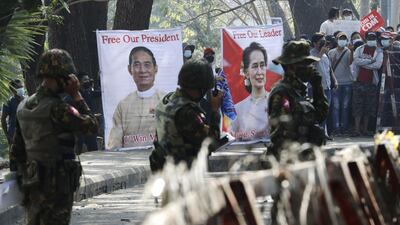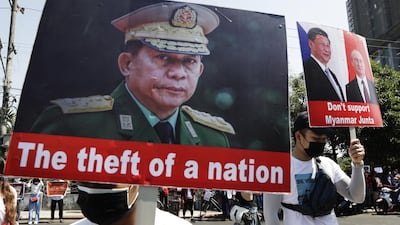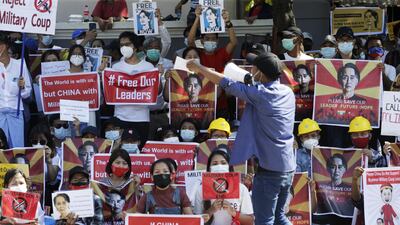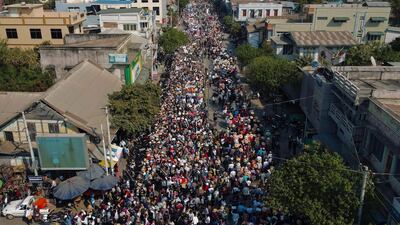Myanmar’s military junta cut the country’s internet and put more troops on the streets across the nation on Monday as protesters defied fears of a widespread crackdown on anti-coup rallies.
The military has increased efforts to quell an uprising against their capture of power two weeks ago, when civilian leader Aung San Suu Kyi and hundreds of members of her democratically elected government were detained.
Tension was heightened on Monday when the military that ousted Ms Suu Kyi from power extended her detention.
She was expected to be released on Monday but her lawyers announced her detention had been prolonged to Wednesday, when she will appear in court by video conference.
The Nobel laureate remains under house arrest on a minor charge of possessing unregistered imported walkie-talkies.
With protesters demanding Ms Suu Kyi's release and refusing to back down, the generals imposed an internet shutdown on Sunday night and increased the military’s presence.
Monitoring group NetBlocks said an eight-hour “state-ordered information blackout” had taken the country almost entirely offline Sunday night.
But some internet services in Yangon resumed on Monday morning.
Residents woke to find armoured personnel carriers in major cities, including Yangon, the nation’s commercial centre and biggest city, with a large number of troops near the central bank.
Despite the increased military presence, protests flared on Monday morning.
Hundreds of engineering and technology students protested in a northern district of Yangon, AFP reported.
In the country's capital of Naypyidaw, about 40 student demonstrators were detained on Monday morning after staging an anti-military protest.
A video posted on social media by one of the students showed them chanting slogans of defiance as they were taken away in a police bus.
"Remember, we don't swear at the police and don't sign anything at the police station," one student can be heard saying.
About 100 people gathered outside the prison to rally for the students to be released.
In Mandalay, civil servants, medical workers and other professionals took to the streets, armed with placards that read "Stop arresting people illegally at midnight", and "Please save our leader, future, hope."
After a day of largely peaceful protests there, security troops tried to disperse protesters by shooting what appeared to be rubber bullets into the crowd.
Monday's events follow the harsh crackdown on protesters on Sunday night, when troops in the northern city of Myitkyina fired tear gas then shot at a crowd.
It was unclear whether police had used rubber bullets or live rounds.
Local media outlets published pictures of people wounded in the incident and reported that at least five journalists were detained.
A joint statement from the US, British and EU ambassadors urged security troops not to harm civilians.
“We call on security forces to refrain from violence against demonstrators, who are protesting the overthrow of their legitimate government,” they said.
UN Secretary General Antonio Guterres urged authorities to “ensure the right of peaceful assembly is fully respected and demonstrators are not subjected to reprisals”.
Mr Guterres also asked the military to “urgently” allow Swiss diplomat Christine Schraner Burgener to visit Myanmar and “assess the situation first-hand”.
The US embassy advised American citizens to shelter in place and not risk defying an overnight curfew imposed by the regime.
UN special rapporteur Tom Andrews said the junta’s efforts to rein in the country’s protest movement was a sign of desperation and amounted to a declaration of war against its own people.
“Attention generals: You will be held accountable,” Mr Andrews wrote on Twitter.
Much of the country has been in uproar since soldiers detained Ms Suu Kyi and her top political allies on February 1, ending a decade-old democracy after generations of junta rule.
She spent years under house arrest during an earlier dictatorship and has not been seen in public since she was detained again.
An internet cut last weekend failed to quell resistance in which huge crowds throng big urban centres and isolated frontier villages.
Striking workers who led the campaign are among at least 400 people to have been detained since the coup, said the Assistance Association for Political Prisoners, a monitoring group.
Fear of arrest did not deter crowds from returning to streets around the country for the ninth day straight of street protests on Sunday.
In the southern city of Dawei, seven police officers broke ranks to join anti-coup protesters.
Parts of the country had formed neighbourhood watch brigades to monitor their communities and prevent the arrests of residents joining the civil disobedience movement.
“We don’t trust anyone at this time, especially those with uniforms,” said Myo Ko Ko, a member of a street patrol in Yangon.
The country’s new military leadership has so far been unmoved by international condemnation.
An emergency session of the UN Human Rights Council on Friday called for the new regime to release all arbitrarily detained people and for the military to hand power back to Ms Suu Kyi’s administration.
The junta insists it took power lawfully and has told journalists in the country not to refer to it as a government that took power in a coup.























